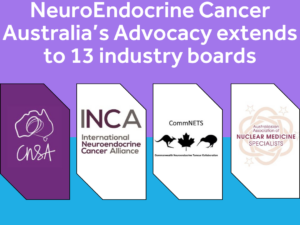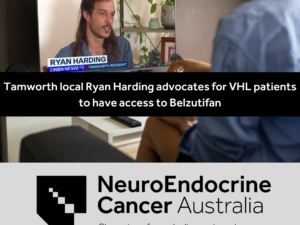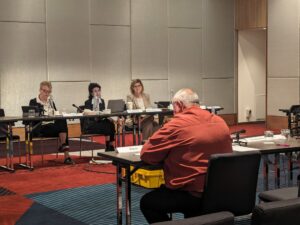In May 2021 NECA and PC4 (Primary Care Collaborative Cancer Clinical Trials Group) met prior to the their annual meeting to discuss the issues faced by our patients within the health system with regards to continuity of care provided by GPs and specialists. What evolved from that meeting was the foundation of the AUSNET trial, recently announced for funding by the Federal Health Minister through the Medical Research Future Fund (MRFF). This $2.3 million in funding for the trial is an extraordinary accomplishment.
The trial will establish the effectiveness of a shared-care model, shifting follow-up care for those with NETs away from acute hospital settings and maximizing the involvement of local health professionals, including the patient’s GP.
The trial, known as AUS-NET, will involve 504 people currently receiving treatment for NETs at five cancer centers of excellence in South Australia, New South Wales, Victoria, Queensland and Western Australia.
Special thanks to Professor Ray Chan, Director of Flinders University’s Caring Futures Institute who will lead the trial for all his hard work in the development of this important project, as well as the team at PC4 and our specialists and centres around the country. “Neuroendocrine tumors are rare cancers that affect fewer than 1 in 5,000 Australians, but those who live with them suffer from a lot of distressing symptoms and treatment side effects and the current health system can’t always meet these patient needs,” says Professor Raymond Chan.
“Furthermore, specialist-only care cannot always sufficiently meet all patient medical needs, and the current system does not allow for the involvement of GPs and allied health professionals.
“What our model will do is to treat people away from specialized cancer centers, in some cases reducing the need to travel, and instead shift the care to a multidisciplinary healthcare team, including the patient’s specialist team, general practitioners, practice nurses, and community allied health practitioners.”
While shared-care models have been implemented previously for more common cancer types including breast cancer, colorectal cancer, prostate cancer, and lymphoma, this will be the first trial to test it on the management of rare cancers, with the care model not currently undertaken anywhere in Australia or around the world.
“With mounting pressure on our acute care and hospital system, beyond the issues we’ve seen during the pandemic, capitalizing on the expertise of primary care is one key strategy for ensuring the sustainability of our health system.
“Our trial will be a world first and the knowledge generated will inform health care policy and completely transform the way people with neuroendocrine cancer, and in the future other rare cancers, are cared for.”
Above all we are looking forward to how this trial will improve the lives our wonderful patients as we strive for better outcomes and even a cure.
Simone Leyden
Co-founder and CEO












